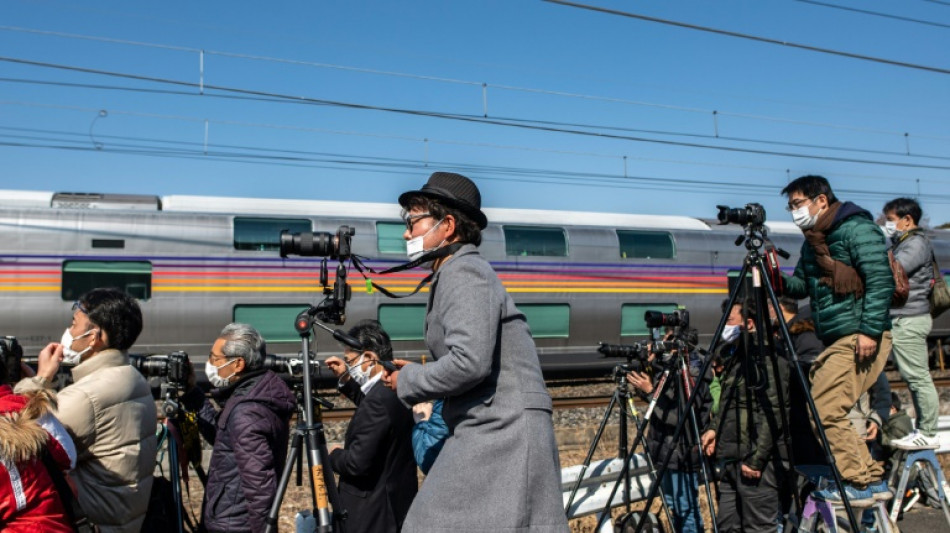

Japan's hardcore train fans accused of going off the rails
Crowding, confrontations and full-on attacks. Japan's many train fans are mostly mild-mannered enthusiasts passionate about the country's famed rail system, but a small group is gaining surprising notoriety.
Japan's railway system has long inspired envy around the world, with its famed punctuality, cutting-edge technology and meticulous timetables.
So it's no surprise that the country is home to a diverse landscape of train buffs, from those who enjoy poring over timetables to others who adore and even record the rumbling sound of passing trains.
Perhaps the best-known group, however, is a tribe dubbed "toritetsu" (train photographers), who strive to take perfect photos of approaching trains.
They have been around for decades, but in recent years, reports of shouting matches, trespassing and even violence at stations have turned toritetsu into the bad boys of Japanese trainspotting.
Some argue the out-of-control behaviour isn't entirely new, citing frenzied farewells for retiring steam locomotives in the 1960s and '70s.
But recent incidents, including the harassment of a photobombing cyclist and an assault that left a teen with a fractured skull last year, have some enthusiasts worried.
"The manners have gotten worse for sure," lamented septuagenarian Masao Oda, who has been taking train photos for about 50 years.
- 'I love everything about trains' -
It's an uncomfortable feeling for toritetsu like 27-year-old Akira Takahashi.
"People now point fingers at me," said Takahashi, whose fondest obsession is the EF66 electric locomotive model, which he describes as his "idol".
"The negative image of us now prevails... I don't want to be lumped together with some of us who are causing trouble."
Most fans are more like 19-year-old Ryunosuke Takagai, a university student who has been known to get up at five in the morning to document his passion and sometimes takes on part-time factory work to finance his hobby.
"I love everything about trains -- their sound, their atmosphere," he told AFP.
"That moment when you succeed in capturing the train you'd spent hours waiting for is truly fulfilling," he said.
The increasingly raucous behaviour of some toritetsu may be driven by their pursuit of the perfect photo, according to Jun Umehara, a freelance railway journalist formerly at one of Japan's top train magazines.
He says factors including fewer "retiring" trains and more urban development mean hobbyist photographers are squeezed into smaller spaces as they chase their dream pictures.
"Every train has its last moment, which, for them, is the last missing piece of the puzzle they need to make their photo collection complete," he said.
"The idea of missing that final piece is almost unbearable for them," added Umehara.
"Hence the desperation."
- No longer 'the enemy' -
Housing development over the years has also seen some old shooting spots razed, making it even harder for toritetsu to emulate the "impeccable" train photos they grew up admiring.
The images, featured by Japan's niche railway magazines with their devoted toritetsu readership, are often taken with a clear view of trains -- devoid of obstacles like fences, trees and passengers.
"But imitating these exemplary photos in real-life situations is almost impossible," Umehara said. "And yet, that's what they're after."
The community of train fans encompasses a diverse group of enthusiasts, including "noritetsu", who simply enjoy riding on trains, "ekibentetsu", who focus on the ekiben bentos -- boxed meals sold at trains stations, and "soshikitetsu," so-called "mourners" of retiring trains.
Nationwide, there were an estimated five million train fans -- from casual to hardcore -- in 2015, according to Nobuaki Takada, a senior consultant at Tokyo-based firm NRI Social Information System Services.
And encroaching toritetsu have become an increasing problem for rail operators, which have often responded with heavier security.
But last year, industry behemoth East Japan Railway Company, commonly known as JR East, changed tack and launched an official fan club for train enthusiasts.
"Toritetsu can actually be counted on to take beautiful pictures of our trains and promote them on the internet," said Yusuke Yamamoto, an official with subsidiary JR East Start UP Co.
"So instead of treating them as our enemy, we wanted to build a good relationship with them through this fan community."
He wants to see the community overcome the stigma associated with its fringe elements, citing the way anime and manga obsessives have become more mainstream and less socially isolated in Japan.
"Toritetsu is a culture, and I hope its image will change," Yamamoto said.
R.Berrycloth--MC-UK




